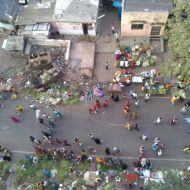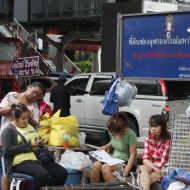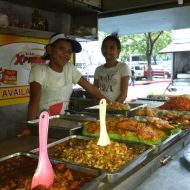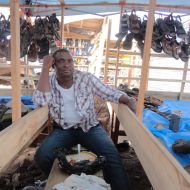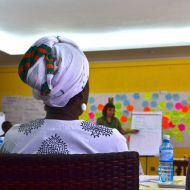Can a Party for the Urban Poor Rise in the Philippines?
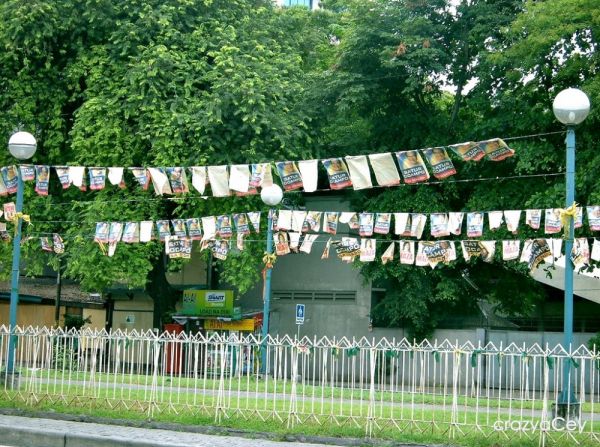
Campaign posters from the 2010 elections in the Philippines. Photo credit: Acey Puno via Flickr Creative Commons
If you want a political party to fight for you, you’ve got to fight for them.
That’s the philosophy that gets Maritess Nedera pounding the pavement every night. Her workday begins when she rises at 7 a.m., prepares a meal for her family and is on the streets of Navotas, a city north of Manila, by eight o’ clock. A street sweeper, she spends her days removing debris from the curbs and gutters for P250 per day, or less than $6 USD.
After that, she gets to work.
At 6 p.m., she peels off her dusty uniform and changes into clothes befitting a political campaigner, and spends the next several hours knocking on strangers’ doors. With the Philippines high-stakes midterm elections less than a month away, she wants to do everything she can to ensure that her Sanlakas partylist group returns to some small form of power.
Sanlakas is an activist political party that has fought for labor rights, women and the urban poor across the country since 1993. It won a seat in Congress in 1998 and 2001, but was delisted as a partylist group by the Commission on Elections in 2010 for failing to win at least two percent of the votes cast for the partylist system in the 2004 and 2007 elections. (The Philippines’ partylist system allows for proportional representation in the House of Representatives, where 20 percent of over 250 seats are allotted to national, regional and sectoral organizations that could not have been otherwise represented through geographical district.)
Nedera has never met any of the five nominees of the Sanlakas partylist group, but she campaigns for them because they fight for issues important to her the group she belongs to: The Zone One Tondo Organization (ZOTO), the Philippines’ oldest existing organization for the urban poor, founded in 1970. ZOTO aids communities that are subject to relocation and possible demolition.
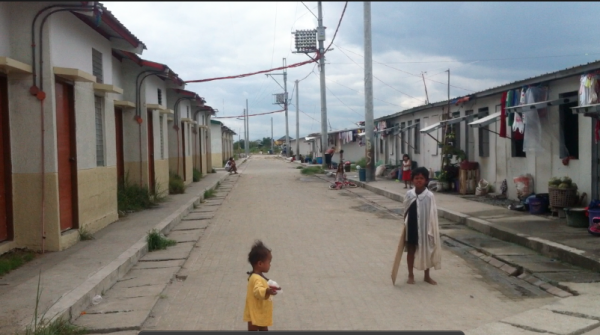
The relocation site in Tanza where Nedera lives. Photo credit: Purple Romero
It was in 2008 that Nedera joined ZOTO. She attended one of the group’s seminars and was instantly transfixed by its focus on domestic violence, HIV/AIDS and the empowerment of women. But it wasn’t until 2011 that Neder became a volunteer for the group. That’s when she and her family lost their house to the devastating Typhoon Nesat. They lived near the coast, in Daanghari village, and their house was washed out to sea as the typhoon pummeled the country, killing 55 and causing $201 million in damages. After that, they joined hundreds of families living in cramped evacuation centers in Navotas. Each family lived in a 10-meter space with no partitions inside. Four hundred families shared a total of two shower rooms and two toilets.
Neder says they didn’t feel safe in there. There was no privacy. “The place was unsafe for women,” she says. Living in the evacuation center opened her eyes to the violations committed against women in the Philippines. She can still hear the marital fights, see the casual violence. Neder was no stranger to poverty – her husband, a welder, earns only $8 USD a month — but she says she saw crimes committed in the evacuation center that she had never experienced before.
At that point, she decided that she could no longer simply be a passive supporter of ZOTO.
She became a volunteer and helped mobilize support for the group, which included organizing rallies calling for the passage of the reproductive health bill and the sin tax bill, both of which were signed into law in 2012.
When ZOTO asked her to help campaign for Sanlakas for the 2013 midterm elections, she immediately got on board. This time around, however, Nedera has a specific legislative measure in mind that she wants to see passed by Congress: She wants people like her, who have been moved to relocation sites, to be given permanent homes.
After their five months in the evacuation center, Nedera and her family were transferred to a relocation site in Tanza, Navotas, but they can only stay in their new homes for 25 years. After 25 years, if they had a “good record” in the community, they can have the contract renewed for another 25 years.
This is not enough for Nedera, however. “We want the house to be ours,” she said.
This is why she’s campaigning hard to have Sanlakas back in Congress. She said they were promised the home-ownership issue will be one of the polices that the partylist group will push for once they’re back in power.
Being a volunteer is no walk in the park. Nedera does not receive any pay; only her transportation fares are reimbursed. Nevertheless, her goal is to talk to 1,000 families, and influence their decisions before they cast their votes on May 13. So far, she has talked to 74.
Nedera has no political ambitions. She knows it is difficult, if not impossible, for people who lack financial resources to win elections. She belongs to the biggest voter base in the country: The masses. In this country, however, most public officials come from the moneyed few. But Nedera knows this is her chance to have a voice in governance, so she’s taking it.
“I was awakened,” she says. “I realized that I’m not just confined to the four corners of the house. I can do something more.”


